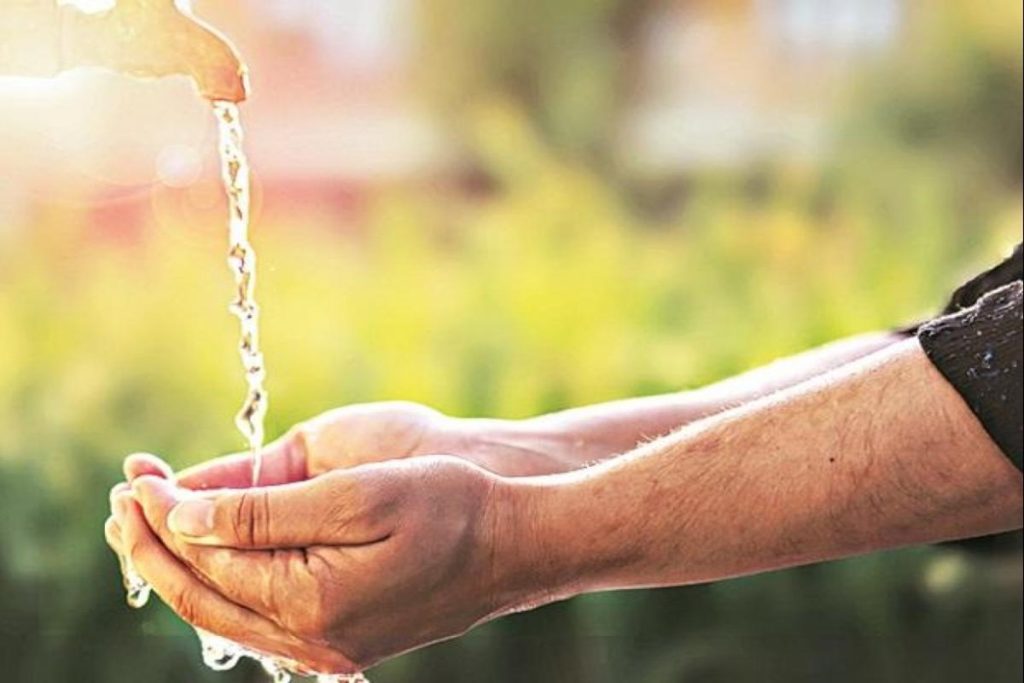After ensuring 100% rural households have provision of tap water supply in their homes in six districts – Anand, Botad, Gandhinagar, Mehasana, Porbandar and Vadodara – and more than 90% across 17 districts – Morbi, Jamnagar, Patan, Bharuch, Dang, Junagadh, Gir Somnath, Kachchh, Rajkot, Ahmedabad, Navsari, Amreli, Banas kantha, Bhavnagar, Surat, Surender Nagar and Kheda.
Gujarat is rapidly expanding access to drinking water for rural residents. In the state, approximately 90% of rural households have access to piped drinking water. By October 2022, the state intends to reach 100 percent saturation.
Dual source planning is used in the villages of Bhavnagar district. Water from open wells is used for drinking water after a good monsoon. Villages draw water from the Mahi Pariage Regional Water Supply Scheme during the dry months (the scheme gets water from Mahi River as well as Narmada when required).
The GWSSB supplies water up to the village level. Rainwater harvesting is also practised by a large number of rural households in the district.
At the village level, Water & Sanitation Management Organization (WASMO) is leading the technical part of JJM implementation.
In Talaja and Mahuva blocks of Bhavnagar district, Gujarat-based Coastal Salinity Prevention Cell (CSPC), with long experience of working with rural communities of Gujarat in drinking water supply and access issues, rainwater harvesting and water resource management, is leading the programme IEC activities, community mobilization, and training programmes for Pani Samitis and Gram Panchayat members.

CSPC through its community mobilization, awareness and capacity building programme has played a key role.
In the initial stages during Covid-19 pandemic restrictions, CSPC raised awareness on programme components, the roles and responsibilities of Pani Samitis, health benefits of household supply of potable piped water supply, etc., through digital media such as WhatsApp groups, animation films, etc the CSPC had undertaken campaigns that mobilized community contribution and ensured programme ownership by the Gram Panchayat .
According to CSPC field managers and trainers, even villages without FHTC had their Pani Samitis set up during the previous programme CSPC activated these Pani Samitis for implementing in-village water supply systems under JJM Programme by raising their programme awareness and capacity building through training.
In some villages, where Panchayat elections had taken place, CSPC helped Gram Panchayats set up their Pani Samitis
Training of Pani Samitis in water quality testing, monitoring and surveillance using field test kits were undertaken Currently, WASMO conducts pre and post-monsoon water quality assessments through water quality laboratories. In villages, where the schemes are now operated by Pani Samiti, households pay minimum monthly user charges. Some Pani Samitis collect user charges on monthly basis, whereas a few Samitis have set up a system of half yearly collection of water charges -either during Diwali or Holi.
In Gujarat’s rapid scaling up of rural piped drinking water supply some factors have played a catalytic role
Apart from training Pani Samitis in various aspects of in-village water supply and management, the Government of Gujarat recognizes their work and efforts through annual awards and recognition.
On World Water Day, a Pani Samiti with a good track record in O&M of their in-village water scheme gets an award equivalent to 10% of its in-village scheme cost as a fixed deposit with a three-year lock-in period.
The Gujarat government also recognises the work of all women Pani Samitis as another effort to encourage women to participate in Pani Samitis. Women’s empowerment in the water sector has sparked a competitive spirit in water distribution management and improved Gujarat’s results.
WASMO has developed a strategy to build the capacity of Pani Samiti/Gram Panchayat of villages in gathering and analysing O&M information of in-village schemes, MIS data verification related to water quality testing and uploading the data in the MIS, training of pump operators, plumbers, and electricians, and understanding the provisions of water audit in reference to the Gujarat Domestic Water (Protection) Act, using a futuristic approach.



